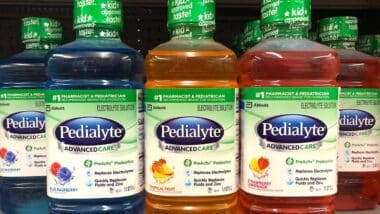 A 1998 report on the top selling antidepressant drug, Zoloft, shows a scientist warned Pfizer executives about the potential birth defects risk, stating over a dozen birth defects were caused by Zoloft and recommending that changes be made to the anti-depressant drug’s safety warning and label.
A 1998 report on the top selling antidepressant drug, Zoloft, shows a scientist warned Pfizer executives about the potential birth defects risk, stating over a dozen birth defects were caused by Zoloft and recommending that changes be made to the anti-depressant drug’s safety warning and label.
Pfizer has consistently rejected allegations Zoloft causes birth defects and has stated that the report was taken out of context. Pfizer is facing more than 1,000 lawsuits, alleging that the company sold Zoloft knowing it could cause severe birth defects in newborns. This document from Pfizer’s drug safety official may complicate the company’s efforts to defend against these Zoloft birth defect lawsuits brought by parents of babies born with congenital defects.
What is Zoloft?
Zoloft (sertraline chloride) is an antidepressant that was developed and manufactured by Pfizer in 1990. It was originally developed for the U.K. market and was released under the brand name Lustral. Pfizer developed and marketed Zoloft as a safer alternative, with fewer side effects and withdrawal symptoms than competitor drugs such as Prozac, which was developed and manufactured by Eli Lilly.
Nine years after its release in the U.K., the U.S. Food and Drug Administration (FDA) approved Zoloft for use in the United States. By 2005, Zoloft was the most popularly prescribed antidepressant on the U.S. market, with nearly 30 million prescriptions being written. In that same year, it was the sixth most prescribed brand-name prescription medication, grossing nearly $2.6 billion.
Zoloft comes from a class of antidepressant drugs known as SSRIs (selective serotonin reuptake inhibitors). SSRIs have been used to control depression and other mental illnesses since the early 1980s. Today, they are the most prescribed class of antidepressant medication on the U.S. market. They are popular mainly due to the fact that they have fewer side effects than other types of antidepressants. SSRIs work by controlling the brain’s level of serotonin, which is a neurotransmitter thought to affect mood, sleep and learning.
Zoloft is primarily used to treat major depressive disorders (MDD). However, doctors also prescribe it for post-traumatic stress disorder (PTSD), premenstrual dysphoric disorder (PMDD), obsessive-compulsive disorder (OCD), social anxiety disorder and panic disorder.
Zoloft and Birth Defects
The FDA uses “pregnancy categories” to communicate whether or not a drug is safe to take during pregnancy. Zoloft is in category “C,” which means that animal studies have shown some harm to the fetus, but there have been no adequate studies in humans.
Research shows, however, that babies born to mothers who have taken Zoloft or another SSRI after the 20th week of pregnancy are more likely to suffer from persistent pulmonary hypertension of the newborn (PPHN), which is fatal in 10 percent of cases. In addition, one study showed that women taking sertraline had twice the risk of having a baby born with aheart defect.
Using SSRIs while pregnant — or even up to a month before conception — can also lead to a fatal birth defect called anencephaly, in which a large portion of the brain and skull never develops. In addition, babies are more likely to suffer from facial malformations such as cleft lip and cleft palate if a mother took an SSRI during pregnancy.
Zoloft Lawsuits
A number of parents have begun filing Zoloft lawsuits against Pfizer after their babies were born with birth defects. These Zoloft lawsuits claim Pfizer did not offer adequate warning about Zoloft side effects, namely the risk of congenital birth defects when taking the SSRI drug.
Federal lawsuits against Pfizer over Zoloft birth defects are consolidated under multidistrict litigation (MDL) in the U.S. District Court for the Eastern District of Pennsylvania. More than 1,000 Zoloft birth defect lawsuits are part of the MDL.
Do YOU have a legal claim? Fill out the form on this page now for a free, immediate, and confidential case evaluation. The birth defect attorneys who work with Top Class Actions will contact you if you qualify to let you know if an individual lawsuit or class action lawsuit is best for you. [In general, birth defect lawsuits are filed individually by each plaintiff and are not class actions.] Hurry — statutes of limitations may apply.
ATTORNEY ADVERTISING
Top Class Actions is a Proud Member of the American Bar Association
LEGAL INFORMATION IS NOT LEGAL ADVICE
Top Class Actions Legal Statement
©2008 – 2025 Top Class Actions® LLC
Various Trademarks held by their respective owners
This website is not intended for viewing or usage by European Union citizens.
Get Help – It’s Free
Join a Free Birth Defect Lawsuit Investigation
If you or a loved one took Zoloft, Prozac, Lexapro, Effexor, Celexa, Cymbalta or Depakote during pregnancy and gave birth to a child with a congenital defect, you may have a legal claim against the drug’s manufacturer. Find out if you qualify to pursue compensation for your child’s medical expenses, pain and suffering, and other damages by filling out the form below now.
An attorney will contact you if you qualify to discuss the details of your potential case.
Oops! We could not locate your form.












